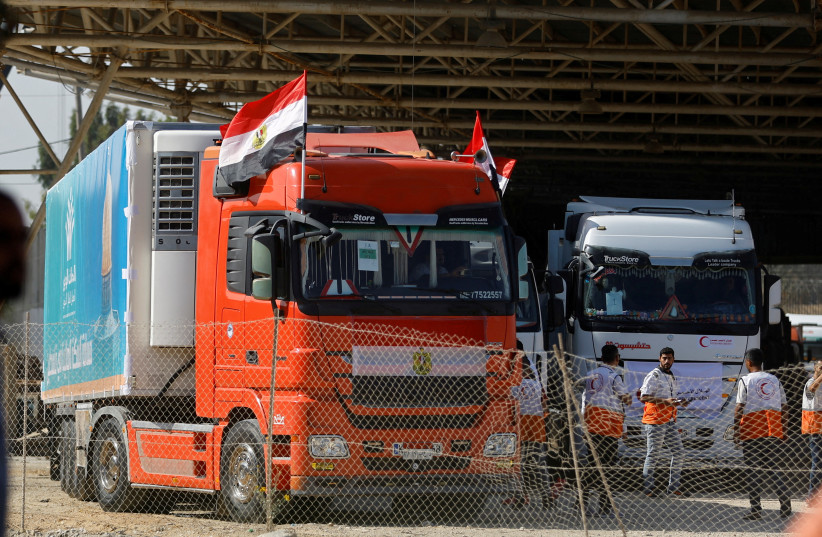Humanitarian aid trucks entered Gaza through Egypt’s Rafah crossing for the third successive day on Monday as the European Union foreign ministers discussed in Luxembourg the need for a pause in the fighting between the IDF and Hamas.
“Now, the most important thing is for humanitarian support to go into Gaza,” European Union foreign envoy Josep Borrell told reporters on arrival in Luxembourg.
EU members including France, Spain, the Netherlands, Ireland, Slovenia and Luxembourg have also backed the idea.
“There’s a vital need to get water, to get food, to get medical supplies into Gaza,” said Irish Foreign Minister Micheal Martin. “The degree of human suffering is immense. We have to distinguish between the civilians of Gaza and Hamas.”
Israel has banned the flow of goods, fuel, food and electricity into Gaza since October 7 until Hamas agrees to release the 222 hostages it captured during its infiltration into Israel that day.
Hamas also killed over 1,400 civilians and soldiers during the assault which sparked a new Gaza war and threatens to expand into a regional conflict.

The plight of Palestinians in Gaza
Global attention, however, has focused on the plight of the close to 5,000 Palestinians in Gaza who have been killed due to IAF bombing of the Gaza Strip and from failed Palestinian rocket launches. According to the UN some 1.4 million Palestinians, out of a population of 2.3 million, have been displaced. One issue, in particular, has been the lack of fuel needed for Gaza’s sole power station, a vital facility for producing drinking water.
US Special Envoy for Middle East Humanitarian Issues David Satterfield has worked in the last day to create a special mechanism to allow for the regular flow of humanitarian assistance into Gaza through Rafah.
British Prime Minister Rishi Sunak said on Monday that his government would provide an additional 20 million pounds ($24.5 million) of humanitarian support for Gaza.
“We need a constant stream of aid pouring in, bringing the water, food, medicine and fuel that is so desperately needed,” Sunak told lawmakers in an update on the situation.
“We are providing an additional 20 million pounds of humanitarian aid to civilians in Gaza, more than doubling our previous support to the Palestinian people.”
Earlier this month the European Union pledged 50 million euros ($53.4 million) for humanitarian aid for Gaza.
The European Union edged on Monday towards endorsing a “humanitarian pause” in the war while other member governments signaled reservations about the idea.
Borrell said he backed a call by UN Secretary-General Antonio Guterres for a break in the conflict to allow much more humanitarian aid to reach the besieged Gaza Strip.
The divergence in views broadly reflected longstanding differences within the EU over the conflict, with those seen as more sympathetic to Palestinians pushing for a pause while staunch allies of Israel were more reluctant.
EU officials also drafted a statement in support of the proposal for an EU summit later this week, although they cautioned the text could still change in the coming days. Some ministers openly expressed reservations about the proposal or avoided a direct answer when asked about it.
Asked why Germany had not backed calls for a humanitarian ceasefire, Foreign Minister Annalena Baerbock said recent days had shown the importance of getting aid into Gaza but had also made clear that Hamas was continuing to attack Israel.
“We’ve all seen that the terrorism continues non-stop, that massive rocket attacks against Israel are taking place,” she said. “We can’t end the humanitarian catastrophe when the terrorism from Gaza continues.”
Some questioned whether a pause would impede Israel’s right to defend itself as it seeks to destroy Hamas.
“Of course everyone would wish that the violence comes to an end. But Israel has the right to self-defense,” said Austrian Foreign Minister Alexander Schallenberg.
Czech Foreign Minister Jan Lipavsky questioned “how such a ceasefire should be established with a partner inside Gaza, which Hamas has forcibly controlled since 2007.
In Israel, Prime Minister Kyriakos Mitsotakis met with Netanyahu and said his country supported Israel’s right to act against Hamas in Gaza, but it must guard against harming Palestinian civilians.
“We will continue to be able to support you and to hope that whatever happens, happens without too much of a humanitarian cost.
“But you can count on our support and our help,” said Mitsotakis.
“I come here not just as an ally, but as a true friend. What happened was truly horrible and we from the very first moment defended and supported the right of Israel to defend itself in line with international law,” Mitsotakis said.
He clarified that Greece drew a “very clear distinction between Hamas and the Palestinian people.”
Netanyahu told him, “I always say that the best thing about standing with Israel is standing with Israel in Israel. And you’re doing that. I appreciate the solidarity of you, your government, the people of Greece, at this darkest hour.
“It’s a battle against civilization. It’s civilization against barbarism. We’re on the side of civilization. We have to unite, all together, against Hamas, which is ISIS,” he added.
Mitsotakis is the latest in a line of Western and European leaders to visit Israel, with Dutch Prime Minster Mark Rutte also making a solidarity visit on Monday, and French President Emmanuel Macron who is due on Tuesday.
